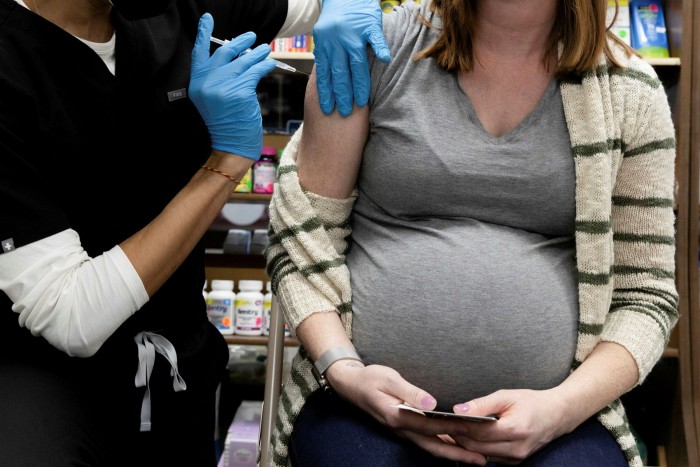Pregnant women under pressure from omicron surge
 With her second baby due later this month, Shin Woo-jeong, 36, decided on a preemptive Cesarean section.
With her second baby due later this month, Shin Woo-jeong, 36, decided on a preemptive Cesarean section.
“I’ve read from the news about (infected) women being transferred while in labor to hospitals in distant cities in search for (a negative-pressure labor ward). I’m afraid I might not be able to find one for myself when my contractions begin,” said Shin, who has scheduled a Cesarean birth a week prior to the baby’s March 25 due date.
So far she has managed to avoid a COVID infection, but she now feels the virus is closing in on her family. Many in her husband’s company have been diagnosed in the past few weeks, she added.
Her first childbirth was a natural one. But this time, she feels she cannot risk the chance of going into labor as a COVID-19 patient amid aggravating bed shortages for people with the coronavirus, she said.
It is not just Shin who feels increasingly under siege from the relentless surge of omicron. Many expecting moms in South Korea are attempting to move their birthing schedules up through a C-section or an induced labor.
South Korea’s daily coronavirus cases remained above 200,000 for the fifth day in a row on Tuesday. And it is taking a toll on the country’s otherwise solid pre- and post-natal care system.
On Monday, there were about 160 beds available for infected women in labor, according to the Ministry of Health and Welfare. In the greater Seoul area, only two were vacant.
“The maternity care for infected pregnant women requires not just obstetricians, but quarantine beds for both (post-partum) mothers and newborns. With the number of COVID-19 confirmed patients increasing rapidly, it has become more difficult to secure these maternity wards,” the ministry’s spokesperson Son Young-rae said.
Min, 31, has experienced what it is like to give birth with COVID-19.
Min, who only gave her surname, was confirmed with the virus in a PCR test she took two days before her Cesarean delivery scheduled on Feb. 14, as requested by her obstetrician-gynecologist.
“An official from the public health center called me and said I would be admitted to an isolation room at a university hospital in Incheon. ... I hurriedly packed my things and soon an ambulance came,” she recalled. “I was so panicked and dazed while being taken to the hospital without my husband by my side.”
She gave birth to a girl at Gachon University Gil Medical Center last month, which is about two hours by car from her home in Yangju, Gyeonggi Province.
As soon as she gave birth through a C-section, she was separated from her baby to prevent the newborn from becoming infected. Nurses and other medical staff sent pictures of her daughter and briefed her on the baby’s health conditions via text messages, she said.
“I know I was fortunate to have quickly found a bed, but it was so frustrating because I couldn’t touch nor say hello to my baby after the surgery.”
On Feb. 15, a woman in her 30s residing in Gwangju gave birth in an ambulance, after failing to find a bed in time. She had been under at-home treatment for COVID-19 when labor began unexpectedly.
Amid mounting worries, an online petition was launched on Feb. 23, calling for government measures to address the issue.
“Just two days before my due date, I was put in home quarantine as my husband tested positive for COVID-19. Although I tested negative, all the local hospitals and maternity clinics in my neighborhood refused to accept me because I was in self-isolation. In this situation, should pregnant women give birth in ambulances or at public health centers?” reads the petition which has garnered more than 2,800 signatures.
On Feb. 25, the government said it would increase delivery beds for infected women to over 200 nationwide within a week. Admitting to a failure, officials said again on Monday that they will try achieving that by next week.
Experts say the government should speed up the process of building a system that connects virus-infected pregnant women with accessible hospitals on a real-time basis.
“An online networking site in which they can quickly find hospitals they can visit to give birth is also urgently needed so that they could avoid dangerous situations. Without the system, some women made their own list of maternity wards for infected mothers and share with others in online spaces,” said Kim Jae-yeon, president of the Korean Association of Obstetricians and Gynecologist.
source: http://www.koreaherald.com/view.php?ud=20220308000162









